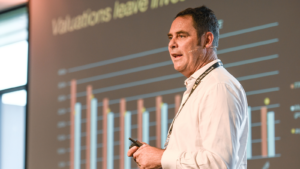-
Sort By
-
Newest
-
Newest
-
Oldest
Healthcare and life sciences is emerging as an economically resilient alternative asset class, given that the industry has huge tailwinds in the form of the demographic force of an ageing population around the world. Plus, there is the growing demand from lifestyle diseases – illnesses that arise from day-to-day life habits of an individual – and the expansion on the back of digital health and AI.
If the holy grail of investing lies in the concept of non-correlated return streams with which to build truly diversified portfolios, insurance-linked securities (ILS) should emerge as one of the options for investors; but they are still not well-understood. That was the message that John Wells, co-founder and chairman of London-based Leadenhall Capital Partners, had for The Inside Network’s recent Alternatives Symposium.
Private markets is clearly a rapidly growing part of the investment ecosystem, with the Australian Securities and Investments Commission (ASIC) recently citing data showing global private capital assets under management (AUM) having tripled over the past decade, to reach an estimated US$14.6 trillion ($23.2 trillion).
And within that, infrastructure is the asset class that is streeting all others in terms of growth, driven by a colossal and multi-pronged funding task.
The Australian image of the taciturn farmer, hard at work completely out of the spotlight, carrying a large part of the nation’s gross domestic product (GDP) on the shoulders of resilient rural families, has a similar feel to the investment performance of the land on which they work. Agricultural land is the quiet achiever of the Australian investment landscape.
In an evolving investment landscape, alternative assets are no longer a fringe consideration—they have become an essential component of a well-structured portfolio. Advisers are increasingly looking beyond traditional equities and fixed income to seek diversification, uncorrelated returns, and improved resilience.
Thematic investing has long been a source of fascination for investors, offering the promise of outsized returns driven by major structural shifts. Yet, as three seasoned professionals—Jamie Nemtsas of Wattle Partners, Will Hamilton of Hamilton Wealth Partners, and Peter Johansson of JCE Advisory—discussed, the reality is far more complex.
Equity markets continue to defy expectations, but investors face mounting risks as valuations stretch to historical extremes. Hugh Selby-Smith, co-CIO of Talaria Capital, recently presented his insights at The Inside Network’s Alternatives Symposium, warning that today’s market environment demands a critical reassessment of diversification strategies.
Institutional investors have increasingly turned to alternative assets as a means of improving portfolio resilience, managing risk, and capitalising on opportunities unavailable in public markets. Australian Retirement Trust (ART) has been a key participant in this shift, developing a strategic approach to investing in unlisted assets that balances risk and opportunity.
The world of alternative investments is at a crossroads. As markets defy expectations and liquidity concerns take centre stage, investors find themselves forced to rethink how they deploy capital in an increasingly complex environment.
Bringing together our insiders community to share perspectives, debate strategies, and refine their approach to portfolio construction is always an enlightening exercise.
For decades, advisers have relied on bonds as the go-to counterweight in a balanced portfolio. But as the correlation between bonds and equities turned positive in 2022–2023, shock ensued; and many investors are rethinking what they thought was a truism.
As the investment landscape evolves, the role of alternative investments remains a topic of debate. Some argue that traditional asset classes – shares and fixed income – are sufficient to build a well-diversified portfolio, while others see alternatives as essential for achieving uncorrelated returns and risk-adjusted growth. Here, we explore both perspectives.
















